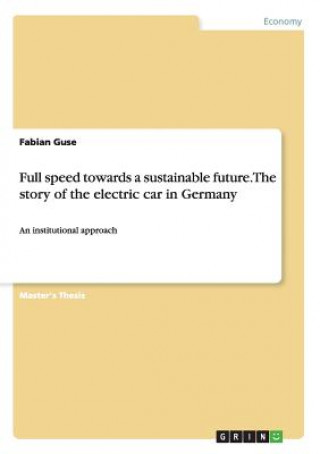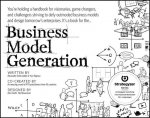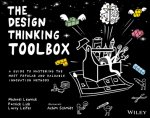
Kód: 09028459
Full speed towards a sustainable future. The story of the electric car in Germany
Autor Fabian Guse
Master's Thesis from the year 2013 in the subject Business economics - General, grade: 1,7, VU University Amsterdam , language: English, comment: Insgesamt 84 Seiten, abstract: I believe in horses, automobiles are a passing phenom ... celý popis
- Jazyk:
 Angličtina
Angličtina - Vazba: Brožovaná
- Počet stran: 88
Nakladatelství: Grin Publishing, 2014
- Více informací o knize

Mohlo by se vám také líbit
Dárkový poukaz: Radost zaručena
- Darujte poukaz v libovolné hodnotě a my se postaráme o zbytek.
- Poukaz se vztahuje na celou naši nabídku.
- Elektronický poukaz vytisknete z e-mailu a můžete ihned darovat.
- Platnost poukazu je 12 měsíců od data vystavení.
Více informací o knize Full speed towards a sustainable future. The story of the electric car in Germany
Nákupem získáte 168 bodů
 Anotace knihy
Anotace knihy
Master's Thesis from the year 2013 in the subject Business economics - General, grade: 1,7, VU University Amsterdam , language: English, comment: Insgesamt 84 Seiten, abstract: I believe in horses, automobiles are a passing phenomenon 1§(Kaiser Wilhelm II, 1905)§More than 100 years ago when the first motorized vehicles appeared on the streets, Kaiser Wilhelm II was not able to see the potential of this invention and how it would change the world he lived in. Today we are facing the next revolution of transportation technology, elec-tric mobility (e-mobility). In consideration of continuous scarcity of fossil resources and pro-gressive environmental issues caused by increasing amounts of CO2 emissions in our atmos-phere, a rethinking of universally accepted habits is needed. Public and private transportation account for 19% of the overall CO2 emissions in Germany and is therefore one of the largest contributors to climate change and local air pollution (Umweltbundesamt, 2011). This circumstance also shows the great political relevance of this topic as well as the need to make the whole industry more sustainable. A sustainable innovation like the electric car can help to decrease the negative externalities of economic growth and reduce the ecological footprint of a modern-day life. Against this background, the German government proclaims that Germany should be the leading market for e-mobility; aiming to have a diffusion rate of one million electric cars until 2020 (Delhaes, 2008). In order to achieve this, they are dependent on the innovation activities of the German automotive industry. But consumers as well as car manu-factures seem to be skeptical about this novelty, which results in a comparable small diffusion rate of only 7114 electric cars in the end of 2012 (Kraftfahrt-Bundesamt, 2013). For instance, in Denmark the diffusion rate of new electronic cars is 30 times higher than in Germany and even The Netherlands have a rate that is 8 times higher (Masson, 2013). The mentioned diffu-sion rate shows the total number of newly registered electric cars in comparison to the total number of traditional fuel cars within a year. This is curious on a first view as Germany has the largest automotive industry in the world, consisting of firms like BMW, Daimler, Opel and Volkswagen. One would hence expect great interest and a proactive stance from both the firms as well as the government in supporting this innovation.§(...)§Table of Content§1. Introduction§1.1. Research Objectives & Research Question§1.2. Research Contribution§1.3. Structure of the thesis§2. Theoretical Framework§2.1. Sustainable Innovation§2.2. Institutional Theory§()
 Parametry knihy
Parametry knihy
Zařazení knihy Knihy v angličtině Economics, finance, business & management Business & management
1677 Kč
- Plný název: Full speed towards a sustainable future. The story of the electric car in Germany
- Autor: Fabian Guse
- Jazyk:
 Angličtina
Angličtina - Vazba: Brožovaná
- Počet stran: 88
- EAN: 9783656754336
- ISBN: 3656754330
- ID: 09028459
- Nakladatelství: Grin Publishing
- Hmotnost: 127 g
- Rozměry: 210 × 148 × 5 mm
- Datum vydání: 07. October 2014
Oblíbené z jiného soudku
-

Personal MBA
357 Kč -

EMPOWERED - Ordinary People, Extraordinary Products
611 Kč -

Transformed: Moving to the Product Operating Model
629 Kč -

Toyota Way, Second Edition: 14 Management Principles from the World's Greatest Manufacturer
704 Kč -

The Millionaire Real Estate Investor
543 Kč -

The Personal MBA 10th Anniversary Edition
441 Kč -

Playing with FIRE (Financial Independence Retire Early)
382 Kč -

Marketing 5.0 - Technology for Humanity
572 Kč -

Thinking In Bets
418 Kč -

The Power of Full Engagement
348 Kč -

Motive - Why So Many Leaders Abdicate Their Most Important Responsibilities
486 Kč -

4 Stages of Psychological Safety
463 Kč -

Official TOEFL iBT Tests Volume 2, Third Edition
970 Kč -

Data Privacy and GDPR Handbook
1783 Kč -

Official Guide to the TOEFL iBT Test, Sixth Edition
810 Kč -

The Hard Thing about Hard Things
597 Kč -

Karmic Management
365 Kč -

Good To Great
618 Kč -

Slight Edge
418 Kč -

The Advantage
567 Kč -

The Goal
660 Kč -

Business Model Generation - A Handbook for Visionaries Game Changers and Challengers
702 Kč -

Fundamentals of Corporate Finance
1973 Kč -

Crucial Conversations: Tools for Talking When Stakes are High, Third Edition
702 Kč -

Millionaire Real Estate Agent
530 Kč -

Business Adventures
358 Kč -

Onward
356 Kč -

Smart Women Finish Rich
375 Kč -

Thinkertoys
462 Kč -

Ready, Fire, Aim - Zero to GBP100 Million in No Time Flat
791 Kč -

Free to Choose
355 Kč -

Secrets of Power Negotiating - 25th Anniversary Edition
517 Kč -

ISE Fundamentals of Corporate Finance
1830 Kč -

Elite Sales Strategies: A Guide to Being One-Up, C reating Value, and Becoming Truly Consultative
538 Kč -

Corporate Finance
1977 Kč -

Leading Growth - The Proven Formula for Consistently Increasing Revenue
538 Kč -

Market Leader 3rd Edition Intermediate Coursebook & DVD-Rom Pack
823 Kč -

Coach's Guide to Reflective Inquiry
635 Kč -

Confidence Code
357 Kč -

Management
638 Kč -

You Can Negotiate Anything
349 Kč -

Design Thinking Toolbox - A Guide to Mastering the Most Popular and Valuable Innovation Methods
684 Kč -

The Big Book of Dashboards
962 Kč -

Death by Meeting - A Leadership Fable About Solving the Most Painful Problem in Business
520 Kč -

Business Made Simple
435 Kč -

Ride of a Lifetime
462 Kč -

Testing Business Ideas - A Field Guide for Rapid Experimentation
688 Kč -

In Search Of Excellence
286 Kč -

Outward Mindset
399 Kč
Osobní odběr Praha, Brno a 12903 dalších
Copyright ©2008-24 nejlevnejsi-knihy.cz Všechna práva vyhrazenaSoukromíCookies




 Vrácení do měsíce
Vrácení do měsíce 571 999 099 (8-15.30h)
571 999 099 (8-15.30h)